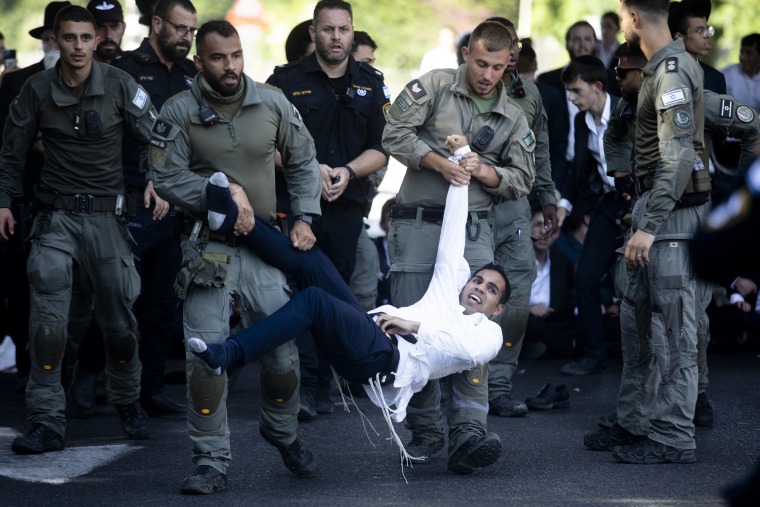Israel’s Supreme Court ruled Tuesday that ultra-Orthodox Jewish men must be drafted into the military, a new blow to Prime Minister Benjamin Netanyahu that could lead to the collapse of his increasingly fragile governing coalition.
At the height of an "intense conflict, the burden of inequality in service is particularly acute,” the court said in a unanimous ruling that sent shock waves through the country in the midst of its monthslong offensive in the Gaza Strip following Hamas' Oct. 7 attacks.
Most Israelis are by law expected to serve in the military. But for decades, exemptions have existed for the ultra-Orthodox, who make up about 13% of Israeli society, to allow them to study full-time in religious seminaries.
The Supreme Court said there was no legal framework that supported a differentiation between yeshiva students and other Israelis eligible for military service. "Consequently, the state lacks the authority to broadly exempt yeshiva students from conscription," it said.
Netanyahu's coalition partly relies on two ultra-Orthodox parties that have called for those exemptions to remain in place and signaled that they could quit the government if they do not.
That would collapse the ruling coalition, imperiling Netanyahu's leadership and forcing Israel into new elections that polling suggests he would likely lose.
The Israeli leader was already forced to dissolve his war Cabinet following the resignation of his chief political rival and former defense minister, Benny Gantz, who has previously expressed support for mandatory conscription for seminary students.

Netanyahu’s Likud party criticized the ruling, saying a bill in parliament backed by the Israeli leader would address the issue, though critics say it falls short of Israel’s wartime needs.
“The real solution to the draft problem is not a Supreme Court ruling,” the statement said.
An Ultra-Orthodox minister, Meir Porush, was among those to condemn the ruling, saying it "inevitably leads to two states" in the country.
Aharon Eitan, a researcher at the Jerusalem Institute for Policy Research focusing on the ultra-Orthodox who is also a certified rabbi and yeshiva graduate, took a different view.
"This is about equality,” Eitan, who enlisted in the Israeli military as a combat soldier about two decades ago, said in a phone interview Tuesday. “The Supreme Court could not make any other ruling," he said, asserting that he believed all Israelis should be willing to share the cost of the war.
"There are people who are carrying the burden and those who do not share it equally," he said.
Debate — and anger — around exemptions for ultra-Orthodox yeshiva students have grown while the country wages war in Gaza, with tens of thousands of soldiers called up to fight.
At least 666 soldiers with the Israel Defense Forces have been killed since Oct. 7, according to the military. Of those, 314 were killed in the months since Israel launched its ground offensive against Hamas in late October. At least 51 soldiers were killed in "operational accidents," the IDF says on its website.
There is growing frustration within Israel and on the international stage over Netanyahu's handling of the war in Gaza, where more than 37,600 people have been killed since Israel launched its offensive following Hamas' Oct. 7 terror attacks, in which some 1,200 people were killed and 250 others taken hostage.
There is little sign of progress toward a cease-fire deal, despite mounting pressure from the U.S., as well as from the families of those who remain held hostage in Gaza.
Hamas announced Tuesday that the sister of leader Ismail Haniyeh was among those killed in an overnight strike in the area of the Al-Shati refugee camp in northern Gaza.
And the families of some hostages demanded an "urgent meeting" with Netanyahu seeking "clear, decisive statements from him regarding the hostage deal."
Netanyahu said Sunday that he would be open to a “partial deal” to return some hostages and continue to pursue his war aim of eliminating Hamas’ presence in Gaza.
He also said that the “intensive” phase of Israel’s offensive in Gaza would soon end — but that Israel’s focus would shift north toward the country’s border with Lebanon amid mounting hostilities with Hezbollah.
Washington bristled at the comments, with State Department spokesman Matt Miller emphasizing opposition to continued Israeli military control over the Palestinian enclave.
"For us, that’s just a recipe for continued conflict, continued instability and continued insecurity for Israel," Miller said in a news briefing Monday. "It is obviously extremely harmful to the people of Gaza who want to be able to rebuild their lives."
His comments came as Secretary of State Antony Blinken met with Israeli Defense Minister Yoav Gallant in Washington, with Blinken urging against any "further escalation" that would risk a broader conflict in the Middle East.
